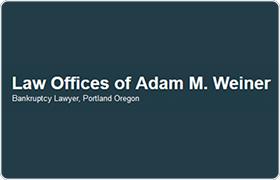Sandy Bankruptcy & Debt Lawyer, Oregon
Sponsored Law Firm
-
 x
x

Click For More Info:
-
Law Offices of Adam M. Weiner
8624 SE 13th Ave Portland, OR 97202» view mapBankruptcy & Debt Premier Bankruptcy Attorney
Life doesn’t always have to be hard. Consult with a bankruptcy attorney who looks out for your best interests. Call today to begin the process for a fresh financial start.
503-719-5123
Matthew A. Casper
Litigation, Consumer Protection, Dissolution, Commercial Bankruptcy
Status: In Good Standing
FREE CONSULTATION
CONTACTFREE CONSULTATION
CONTACTFREE CONSULTATION
CONTACTWyndie J Dwyer
Commercial Bankruptcy, Commercial Real Estate, Real Estate
Status: Suspended Licensed: 54 Years
Kathleen Ann Profitt
Commercial Real Estate, Government, Non-profit, Collection
Status: In Good Standing
Timothy J Zimmerman
Commercial Real Estate, Civil Rights, Credit & Debt, Collection
Status: In Good Standing Licensed: 37 Years
Timothy James Zimmerman
Commercial Real Estate, Civil Rights, Credit & Debt, Collection
Status: In Good Standing Licensed: 37 Years
Sean Reed Blixseth
Entertainment, Employee Rights, Corporate, Credit & Debt
Status: In Good Standing Licensed: 18 Years
Jonathan C Kuni
Landlord-Tenant, Wills & Probate, Bankruptcy, Malpractice
Status: In Good Standing Licensed: 21 Years
 Adam M. Weiner Portland, OR
Adam M. Weiner Portland, OR Practice AreasExpertise
Practice AreasExpertise
